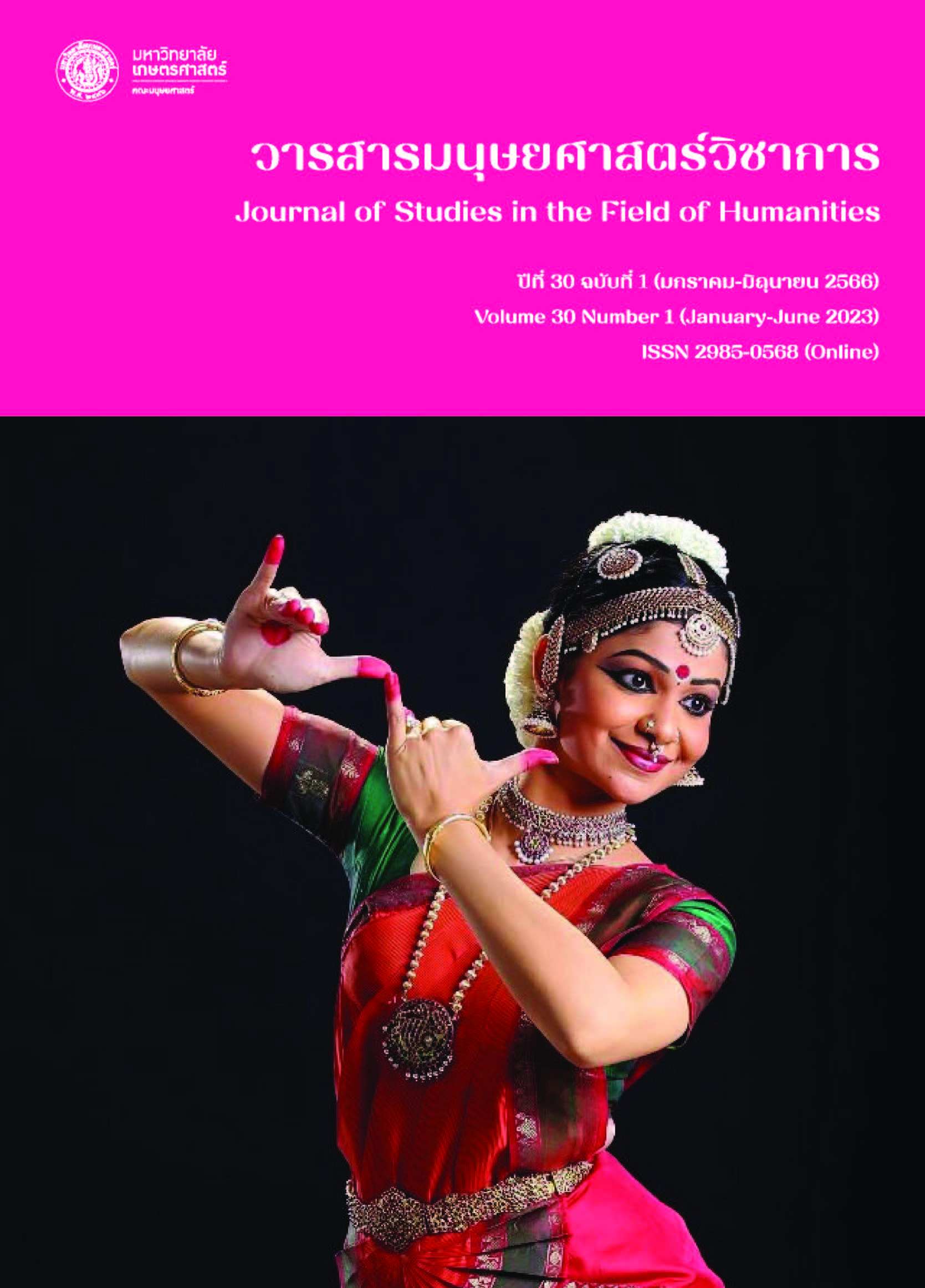An Analysis and Comparison of the Request Strategies Used by Native Speakers of Thai and Korean Speakers of Thai
Main Article Content
Abstract
This research aims to analyze and compare the request strategies used by native speakers of Thai and Korean speakers of Thai. There are 50 participants in this study: 25 Thai native speakers and 25 Korean learners of Thai. The research tool used in this study is the Discourse Completion Test (DCT). The results revealed that both groups of speakers similarly use four types of request strategies: 1) Direct strategy; 2) Conventional indirect strategy; 3) Non-conventional indirect strategy; and 4) Withholding intentions. However, it was found that ‘Obligation statements’, a subtype of ‘Direct strategy’, is used by the Korean speakers only. Finally, this study not only presented the request strategies in Thai but also revealed the interlanguage characteristics of the Korean speakers of Thai.
Article Details

This work is licensed under a Creative Commons Attribution-NonCommercial-NoDerivatives 4.0 International License.
References
ชาพิมญชุ์ บุญวิทยา. (2550). การศึกษาเปรียบเทียบต่างกลวิธีตอบรับการขอโทษในภาษาญี่ปุ่นและภาษาไทย (วิทยานิพนธ์มหาบัณฑิต สาขาวิชาภาษาและวรรณคดีญี่ปุ่น). จุฬาลงกรณ์มหาวิทยาลัย, กรุงเทพฯ.
ประภัสสร เจียมวงษา. (2558). กลวิธีการขอร้องของชาวพม่าผู้พูดภาษาไทยเป็นภาษาที่สอง: การศึกษาตามแนววัจนปฏิบัติศาสตร์ระหว่างภาษาและวัจนปฏิบัติศาสตร์ระหว่างวัฒนธรรม (ปริญญานิพนธ์ สาขาวิชาภาษาไทย). จุฬาลงกรณ์มหาวิทยาลัย, กรุงเทพฯ.
ยางวอน ฮยอน. (2559). การศึกษากลวิธีแสดงความเห็นแย้งของนักศึกษาเกาหลีที่พูดภาษาไทยเป็นภาษาที่ 2 ในการสนทนาแบบแสดงความคิดเห็นในภาษาไทยตามแนววัจนปฏิบัติศาสตร์อันตรภาษา. วารสารภาษาและภาษาศาสตร์, 34(2), 1-19.
รดารัตน์ ศรีพันธ์วรสกุล และณัฐพร พานโพธิ์ทอง. (2563). การศึกษาวัจนกรรมการแสดงความเห็นแย้งของผู้เรียนภาษาไทยชาวจีนตามแนววัจนปฏิบัติศาสตร์อันตรภาษา: กรณีศึกษานักศึกษาชาวจีนจากมณฑลยูนนานและกวางสี. วารสารวจนะ, 8(1), 1-26.
สุขใจ สัจจเทพ. (2555). การศึกษาความหลากหลายเชิงวัจนปฏิบัติศาสตร์: การตอบรับคำชมภาษาอังกฤษของผู้พูดชาวไทยและปัญจาบี (วิทยานิพนธ์ดุษฎีบัณฑิต สาขาวิชาภาษาอังกฤษเป็นภาษานานาชาติ). จุฬาลงกรณ์มหาวิทยาลัย, กรุงเทพฯ.
สุจริตลักษณ์ ดีผดุง. (2544). สถานภาพการวิจัยภาษาศาสตร์ในประเทศไทย: ระบบหน่วยคำถึงระบบประโยคและความหมาย. วารสารภาษาและวัฒนธรรม, 20(3), 21-41.
สุจริตลักษณ์ ดีผดุง. (2549). วัจนปฏิบัติศาสตร์เบื้องต้น. นครปฐม: สถาบันวิจัยภาษาและวัฒนธรรมเพื่อพัฒนาชนบท มหาวิทยาลัยมหิดล.
สำนักงานราชบัณฑิตยสภา. (2560). พจนานุกรมศัพท์ภาษาศาสตร์ (ภาษาศาสตร์ทั่วไป) ฉบับราชบัณฑิตยสภา. กรุงเทพฯ: เอบิซ อินเตอร์กรุ๊ป.
ฮามัม สุปรียาดี. (2548). การศึกษาลักษณะวัจนกรรมที่ปรากฏในเว็บโฆษณาไทย-อินโดนีเซียตามแนววัจนปฏิบัติศาสตร์ (วิทยานิพนธ์มหาบัณฑิต สาขาวิชาภาษาศาสตร์). มหาวิทยาลัยธรรมศาสตร์, กรุงเทพฯ.
Austin, J. L. (1975). How to Do Things with Words (2nd ed.). Oxford: Oxford University Press.
Blum-Kulka, S., House, J., & Kasper, G. (Eds). (1989). Cross-cultural pragmatics: requests and apologies. Norwood. NJ.: Ablex.
Blum-Kulka, S., & Olshtain, E. (1984). Requests and Apologies: A Cross-Cultural Study of Speech Act Realization Patterns (CCSARP). Journal of Applied Linguistics, 5(3), 196-213.
Boonkongsaen, N. (2013). Filipinos and Thais Saying “No” in English. Manusya: Journal of Humanities, 16(1), 23-40.
Brown, P., & Levinson, S. (1978). Universals in Language Usage: Politeness Phenomena. In E. Goody (Ed.), Questions and Politeness: Strategies in Social Interaction (pp. 56-310). Cambridge: Cambridge University Press.
Brown, P., & Levinson, S. (1987). Politeness: Some universals in language usage. Cambridge: Cambridge University Press.
Chen, R., He, L., & Hu, C. (2013). Chinese requests: In comparison to American and Japanese requests and with reference to the “East-West divide”. Journal of Pragmatics, 55, 140-161.
Goffman, E. (1967). Interaction Ritual: Essays in Face-to-Face Behavior. New York: Routledge.
Hall, E. T. (1959). The Silent Language. New York: Doubleday.
Hofstede, G. (2021). Country comparison. Retrieved June 28, 2021, from https://www.hofstede-insights.com/country-comparison/south-korea,thailand/.
Kanchina, Y. (2019). Speech act of requests in Thai spoken by Chinese as a second language: a pragmatic study of interlanguage (Unpublished doctoral dissertation). Mahidol University, Nakhon Pathom.
Searle, J. R. (1969). Speech acts: An essay in the philosophy of language. Cambridge: Cambridge University Press.
Searle, J. R. (1976). A classification of illocutionary acts. Journal of Language in Society, 5(1), 1-23.
Trosborg, A. (1995). Interlanguage pragmatics: Requests, complaints, and apologies. Berlin: Mouton de Gruyter.


